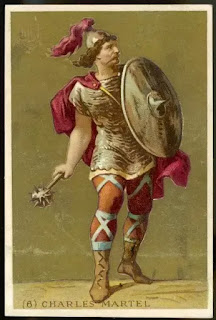Pepin (714-768) was not the only son of Charles Martel to take a leadership role; he's just the one we remember because of his son, Charlemagne. But the Carolingian Age started with Martel, and Pepin was an important part of it before Charlemagne stepped onto the scene. Pepin had two brothers. After the death of their father, Carloman (the eldest) was Mayor of the Palace for Austrasia (including Tournai, Aachen, Cologne and Metz) while Pepin was Mayor of the Palace for Neustria (the territory from Nantes and Tours on the south along the Loire to Soissons in the north). They picked Childeric III to be a puppet king starting in 743, not being willing to take over in their own right.* A third brother, Grifo (son of Charles' second wife), wanted to have some authority, but Pepin and Carloman locked him away in a monastery.
In 747, Carloman decided to retire to a monastery, leaving the running of Austrasia to Pepin. Pepin decided it was time to make a radical change, so he wrote to Pope Zachary with a question: who should be king, the one with the family title or the one who actually exercised the power? By this time, the pope had come to rely on Frankish military support, so he was certainly willing to take the necessary steps. He dethroned Childeric and tonsured him. (The cutting of his hair was a powerful symbol: the Merovingian line believed in not ever cutting their hair as a sign of the royal authority.) Childeric and his son, Theuderic, went to a monastery.
So Pepin the Short (infrequently called Pepin III because his grandfather and great-great-grandfather were both Pepins) became the new King of the Franks, being anointed by the archbishop of Mainz in 752, and then in 754 at St.-Denis in Paris by Pope Stephen II. In order to ensure a succession, the pope anointed Pepin's sons at the same time, establishing that the two boys, Charles and Carloman.
Which is not to say that he never died in battle. He died at the age of 54 in a military campaign. He was interred in the church of St.-Denis. Just as the kingdom was divided among Clovis' four sons, so was it divided again between Pepin's sons Charles and Carloman. The Carolingians had the potential to be just as divisive as the Merovingians who came before. Sibling rivalry can be even more bitter, however, when mother plays favorites.
*Childeric was truly plucked from obscurity; modern historians are not sure of his parentage.

No comments:
Post a Comment
Note: Only a member of this blog may post a comment.